Legal and Civil Issues

This Hub's Agenga
My second passion in life is law. I must confess that I almost became a lawyer and throughout the years this dream has somehow faded out.
So I thouight to myself, if I have not become a lawyer, at least I can post some articles on legal affairs and enjoy the fun of blogging.
This hub will be dedicated to legal and civil issues and I wish the readers much fun reading my materials.
Portland Police Allowed to Enter Without Warrant
At about 8:15 p.m. on Friday March 1, a federal jury ruled that Portland police officers were legally entitled to enter and search a home in Northeast Portland without a warrant. They did this because they were under the belief that someone was in danger. It was also stated that the officers at the scene did not use inappropriate force to handcuff the residents whilst they searched the house for a possible victim. This verdict came after the jury had been deliberating for more than five hours, after a trial which lasted four days.
The case stated that Patsy McKinney and Thomas Glenn objected to the police entering their home without an appropriate search warrant. The event that triggered this raid was a 9-1-1 call placed by a passerby who stated that slamming noises and female screaming were heard coming from the house.
According to the police officers on site they needed to enter the home to ensure that no-one in the house was injured. The attitude of the occupant of the house was such that the officers felt that he could well be hiding something.
It was at this point that they entered the home, handcuffing both residents in order for them to commence the search.
Residents Clean Up Criminal Records Legally
Good News for US Criminals!!!
A procedure called expungement was introduced on November 1. This procedure allows an individual to clear criminal records they may have.
The process involves filing a request that the court erase the record of the arrest and seal the court records.
An expungement can only be obtained if the person meets certain criteria. An individual who was found not guilty by a jury, or who was pardoned, can apply for an expungement. If the individual’s case was dismissed within a period of one year after his/her arrest, he will qualify for an expungement.
The law has also been relaxed to include an individual who was granted a deferred adjudication for a misdemeanor, meaning that he/she was granted 2 years probation with no conviction. In this case the individual’s record can be expunged after 2 years have passed. Non-violent felonies can be expunged after a ten-year period. A person convicted of a misdemeanor can apply for an expungement after 10 years as long as he has not been in trouble during that time period.
There are several benefits to obtaining an expungement as a criminal record can be an obstacle in job applications or even in opening a bank account. It is not necessary to employ a lawyer to process the application, but if you are uncertain about the procedure, it may be wise to do so.
Cleaning up your criminal record

Constitution and citizenship day
Celebrating Citizenship
Constitution Day or Citizenship Day is a celebration of American citizenship. It is an annual event in the United States federal calendar commemorating the completion and signing of the US Constitution and also recognizes those who have become American citizens, whether on reaching the stipulated age or by naturalization.
Every year, it is observed on September 17, the same day in 1787 on which the Constitution was signed by the members of the Constitutional Convention. This historic day was first recognized by schools in Iowa in 1911 and in subsequent years, there was greater public demand for a specific day to celebrate American citizenship. Finally, in 2004 by the passage of an amendment, Constitution Day was legally declared a holiday to be celebrated nationwide through various programs and events.
As an integral part of the Constitution Day celebrations, it is compulsory for all educational institutions receiving federal funding to conduct informative programs which will inform students about the history and significance of the day, along with the rights and responsibilities of mature citizens. Constitution Day is not a federal holiday and government staff is not granted any leave to observe this day.

Protecting Rights of Individual Citizens
The Bill of Rights is a legal document guaranteeing the rights of individual citizens and their protection against federal violation of civil rights. After the United States Constitution was drafted and set for debate, many of its opponents pointed out several areas in the draft which could later be misused by the federal government against its own citizens to curb their civil rights, liberties and properties.
Their fear mainly stemmed from the bitter experience they had of the tyranny of the British government against the citizens in its colonies.
Twelve amendments to the Constitution draft were thereby suggested by the First Congress on September 25, 1789; which were considered enough to meet the concerns of the opponents. Of the twelve, the first two amendments dealing with the compensation for Congress members and the number of constituents for each member were not accepted.
The remaining ten amendments were accepted and passed by three-fourth majority in the Congress and constitute what we now know as the Bill of Rights.
Bill of Rights
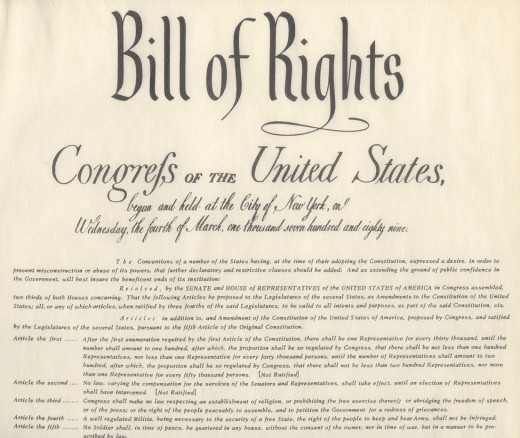
Beware of White Collar Crimes
In criminology, the phrase White Collar Crime means any illegal monetary income procured through non-violent crimes committed typically for monetary gains. It is usually conducted by people of high rank and respect and enjoying an elevated social position.
White Collar Crimes can become an integral part of corporate crime as the opportunity, resources and intelligent to commit such crimes like fraud, forgery, embezzlement, insider trading etc., are more easily accessible to people engaged in white collar jobs in managerial or administrative capacities.
The term was originally proposed by Profession Edwin Hardin in 1939 who conjectured that white-collar crime was typically different from ordinary petty crimes committed by seasoned criminals. Unfortunately, white collar crimes is on the rise nowadays and has become synonymous with frauds and cheating in high places by people in power.
This type of crime can have more serious repercussions than standalone crimes like murder, as a single fraud or forgery can have a direct effect on the future of a company and its employees, cheat investors of their life’s savings and affect the economic health of the government.

Types of White Collar Scams
Fraud is the most common type of white collar scam. Bank fraud is where the bank is depleted of all its funds through fraud activities. Computer fraud committed by computer hackers is a serious white collar scam where all the information on the computer like bank details and credit card numbers are stolen. Credit card fraud is another type of white collar crime where the card is used by an unauthorized person to purchase goods or service.
Embezzlement is a type of white collar crime where a person entrusted with property or money uses it for his/her benefit. Blackmail where money or certain considerations are demanded under threat to life or property is also white collar crime.
Money laundering where money obtained through illegal sources like drug trafficking is transferred so that the source becomes legitimate or untraceable. Tax evasion is another type of white collar crime wherein tax is not paid fully.
White collar crime
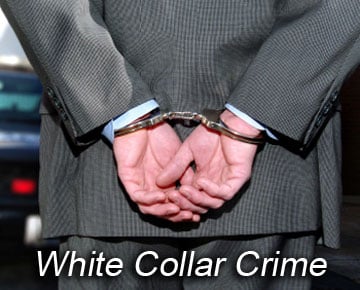
Which Industries Experience the Most Number of White Collar Scams?
Finance industry faces the most number of white collar scams. Bankruptcy fraud is one such crime which is very common. Bankruptcy procedures are lifesaving to honest and deserving people. But fraudsters use this method to get out of paying their debts even though they have enough finance to do so. Private Citizens, politicians, real estate agents and small time businessmen are the usual culprits of bankruptcy fraud.
Banking fraud is also one of the most reported white collar crime. Here an individual tries to rob the bank of all its funds and finances. This is done after a long and careful planning period.
Loan frauds, insurance frauds, health care frauds, environment frauds and money laundering are some of the other common while collar scams. In all these fraud cases, it is the economy of the country that takes a toll. So it is up to the citizens to put a stop to white collar crimes in the country.
How to Report White Collar Fraud?
White collar frauds and crimes affect not only individuals or companies but also the economy and the country. So as it is the duty of every responsible citizen to be alert and report any white collar fraud.
Contact your local FBI office if you sense any white collar fraud. The FBI has 56 offices which are centrally located in all the major cities across US. The FBI officers are well-equipped in dealing with such white collar crime cases.
You can also visit the FBI website and leave an online tip if any, regarding the crime. An FBI agent will attend to the scam if your tip is informative.
If you are victim or witness to any internet crime, then you can file a complaint with the IC3. IC3 deals with internet crime and fraud. Ensure that you leave your phone number, name and address so that the IC3 can contact you for additional information.
Number of White Collar Scams Prosecutions in Recent Years per Administration

White Collar Crime Statistics in USA
The previous few years have shown an alarming increase in the number of white collar crimes. In June 2012, 17 white collar crime cases were recorded by the US magistrate court.
These courts handle petty offence cases.
Here are some of the statistics recorded in the US district court
in June 2012. Bank fraud is the most recorded white collar crime.
It was ranked 1 last year and five years ago. There were 80 cases o
f bank fraud recorded this year.
Fraud by television, radio and internet is recorded 2nd.
There were 53 such fraud cases. 48 conspiracies to fraud the US government
cases were filed this year.
The justice Department has reported 200.9 white collar
crime cases for 10 million people across the country.
The Southern District of Alabama is ranked first for having
the most number of white collar crimes. It had 872 convictions this year.
To read more about white crime in the US, go to the FBI site
Cracking Down on White Collar Crime
New US pension laws
The feeble economic condition of the US has influenced the federal government to enact a new law which gives undue leverage to the business community by allowing them to contribute less towards their employees’ pension funds. This is likely to affect millions of workers and retirees who depend on their pension as the sole source of substantial income.
Detractors of the pension plan are however critical of its application as they feel that it would provide a further excuse to the corporate sector for not spending on employee retirement benefits as the existing pension plans are already being phased out in many companies.
Additionally, the new pension plan puts the onus of saving more for the future on the employees thereby forcing them to shell out more as their contributions to pension plans. It is expected that under such a scenario, employees will either be severely strained in trying to maintain a pension plan with high contribution or forego their pension schemes completely.
Beurden of pension on US states
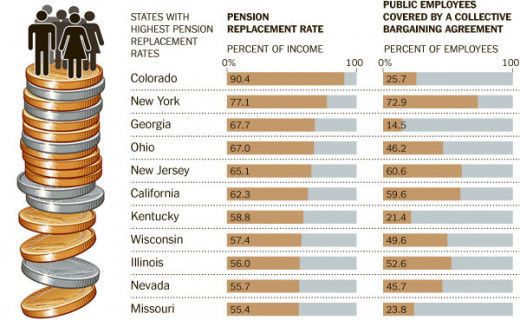
Rights of an Arrested Person
An arrested individual in USA has two significant rights – right to a criminal attorney who will defend him in court and the right to remain silent.
Indigent individuals, who cannot afford to hire a criminal attorney, will be offered the services of an attorney from the office of the State Public Defender totally free of cost.
You may not be asked any more questions by the police if you claim one of these rights or both the rights.
Arrested individuals who cannot or are unable to communicate with the attorney or with the court due to language barriers or disabilities are entitled the right to an interpreter or translator.
An arrested individual is also entitled to other rights such as getting a judge to decide if that individual should be freed from prison before the trial and the right to be informed about the penalties possible and to know the charges brought against that person.
Changes in Australia’s Immigration Laws
Australia’s new immigration laws came into effect from July 1, 2011. Under the new guidelines, migrants seeking to make this nation their home, would have to be highly skilled and possess in-depth knowledge of English language.
By bringing in new regulations which rely on a point system for skilled migrants who are moving on their own, the Australian government aims to provide entry to only the best applicants having adequate work experience, quality education and a good grasp over English.
Migrants, who do not have any relatives in Australia to sponsor them, will have to score a minimum of 120 points in order to be eligible while those scoring below 70 will have their applications cancelled automatically.
However, the new system does not apply to migrants who are sponsored by their companies.
According to the government, the change in rules was necessary in response to the new economic challenges facing the nation and aims to bring in skilled workers who would be capable of carrying the nation forward.
Australian Passport

New Zealand Food Bill 2012
A new food bill in New Zealand seeks to replace the Food Act of 1981 and bring in some basic changes into the way the domestic food market is managed. It lays emphasis on food safety, aims to improve commercial output and tries to minimize the compliance cost for the food industry.
The bill covers only those types of food items that are traded commercially and not the food that is shared or home-grown. It also does not cover commercial trading of seeds. It supports innovative food production techniques which produce food hygienically while maintaining the prescribed public health standards.
Many illegal small-time facilities producing traditional favorites like sausage sizzles or market cake are likely to be trained and guided by the new provisions of the new law so that they can attain the standard safety and hygiene benchmark and declare themselves legal.
However, local farmers or those who swap backyard produce are critical of the bill, as it imposes new guidelines for transacting processed items like breads, jams or pickles and levies strict penalties on those who do not follow the guidelines.
New Zealand 2012 Food Bill

How can you find some information on criminal records
I have recently ran into a questiuon regarding how can one find information on criminal records in Texas. Well... according to the FOIA (freedom of information act), data on criminal records are open to the public. That means that you can check on any person in the US regarding his or her criminal past. FOIA is very useful for employers interesting in running background check on a potential employee, or alternatively, private citizens can find out about their neighbor, their friend or their daughter's future husband.
To get this precious information, you should turn to governmental sources. For example, you should contact the sheriff office in your county or visit the archives of court houses- they keep this information.
You might be demanded to pay a fee.
You might want to save the trouble of reaching a courthouse in person. Some institutes will deliver the information via the telephone.
Be advised, if the is an arrest warrant on your name, when you come to the sherrif office, you might be arrested on the spot.
Freedom of Information Act
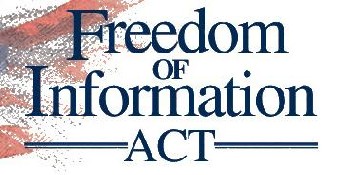
Links to sites dealing with economic, civil and legal issues
- Pension advisers: Existential threat | The Economist
MOST companies have a product or service from which other lines of business can grow. Cadbury has dairy milk chocolate and Apple has the iPhone. For the investment consultant, it’s advising defined benefit (DB) pension schemes. This dependable revenu
ARREST WARRANTS IN VIRGINIA
Under Code of Virginia Title 19.2 (“Criminal Procedure”) Chapter 7 (“Arrest”) Section 72 (“When it may issue; what to recite and require”) arrest warrants in Virginia must “(i) be directed to an appropriate officer or officers, (ii) name the accused or, if his name is unknown, set forth a description by which he can be identified with reasonable certainty, (iii) describe the offense charged with reasonable certainty, (iv) command that the accused be arrested and brought before a court of appropriate jurisdiction in the county, city, or town in which the offense was allegedly committed, and (v) be signed by the issuing officer.”
Who may issue arrest warrants in Virginia? Under § 19.2-71 (“Who may issue process of arrest”) “Process for the arrest of a person charged with a criminal offense may be issued by the judge or clerk of any circuit court, any general district court, any juvenile and domestic relations district court, or any magistrate.” The fact that the “clerk of any” Virginia court may issue warrants indicates that they are not difficult to obtain.
An outstanding arrest warrant is one issued and not yet executed by the arrest of the accused or quashed or withdrawn by the issuing authority on motion or on its own initiative. Once issued Virginia arrest warrants do not expire but remain outstanding indefinitely until served or executed or until quashed.
Most accused targets of arrest warrants know or suspect they are outstanding. Those who don’t know already have no foolproof way to find out online. The only website (virginiawarrants.org) dedicated to statewide Virginia arrest warrant searches “is a work in progress.” Anyone wondering should contact an attorney. The Virginia State Bar Lawyer Referral Service (804-775-0500/ http://www.vsb.org/vlrs) may be helpful.
Attorneys sometimes persuade prosecutors to withdraw arrest warrants or, if not, arrange voluntary appearances that make execution of the warrants unnecessary. After the initial court appearance, the accused may become yet again an arrest warrant target by failing to appear or even by appearing late for a continued or postponed court hearing or event. In that case an arrest warrant known as a “bench warrant” as issued from a courtroom is likely unless an attorney resolves the problem.
For Further Reading:
Arrest Warrant

LA County Arrest Warrants
Supposing the police want to arrest a person in LA County, they cannot do it automatically unless that person was spotted in the middle of a criminal act. Otherwise, the police are going to need an arrest warrant. An LA arrest warrant can be issued only after a judge has signed it.
A judge will not agree to sign any warrant. It is the duty of the police department to indicate to the judge that there exists a probable cause to believe the person against whom the arrest warrant is issued has been involved in a crime that requires an arrest and later on criminal prosecution.
The moment an arrest warrant in LA County (and anywhere else in the United States) is on the air, it will never expire. It will always remain valid and if not served it will become an outstanding warrant. An outstanding warrant has equal validity to an active arrest warrant. That is, you can be arrested anytime and anyplace by a police officer holding the outstanding warrant in his hand.
The question arises: How can you find out if there is an arrest warrant in LA carrying your name and when can you look for it?
You have to options in hand:
The first include conducting a search by yourself. The best place to do it is the sheriff office. This office holds all arrest records and will be willing to reveal this information for a small fee. However, you bear in mind that if the warrant is carrying your name, you will be arrested at the spot.
If you want to remain anonymous, you should go for the second option which includes using the services of a third party that has access to all the records in LA County. This service is not for free and costs more than the first option, but sometimes it is worthwhile paying some extra money to make sure you remain anonymous.
Useful Links:
Los Angeles County Sheriff’s Department
LA County Sheriff's star

Crime Rates in Virginia
An interesting article titled Gov. Bob McDonnell says Virginia's crime rate continues to plummet in July 11, 2011 edition of the Richmond Times-Dispatch is based on two formal reports: Crime in Virginia from the Virginia State Police and Virginia Crime Trends 2000-2009 from the state Department of Criminal Justice Services.
To learn more about crime trends in Virginia, you should visit sites such as Virginia Arrest Records. To learn more about law enforcement in the state, go to Virginia Sheriffs' Association.
The Richmond Times-Dispatch article determines that the governor’s claim regarding a decline in crime rates in Virginia is fundamentally true:
There has been a decline in crime rates in Virginia, though the decline is minor and there have been years in which crime rates have even slightly increased.
The reports analyzed data for the 2000–2010 decade, finding a 19-percent drop in violent crime, more than the 15-percent national average over the same time period. Property crime rates in Virginia fell by 12 percent over the decade, less than the 16-percent national average.
The story takes issue with Governor McDonnell’s claim that “the enormous positive results in Virginia as our crime rate continues to plummet” can be traced to Governor Allen’s decision to abolish parole. The story quotes a Virginia Commonwealth University criminal justice professor who says that most of the ex-criminals who are on parole do not regain theur criminal life style.
The story does not specify any of the “studies that have been done” to support this highly questionable quote.
Crime Rates in A Few Selected States in the US
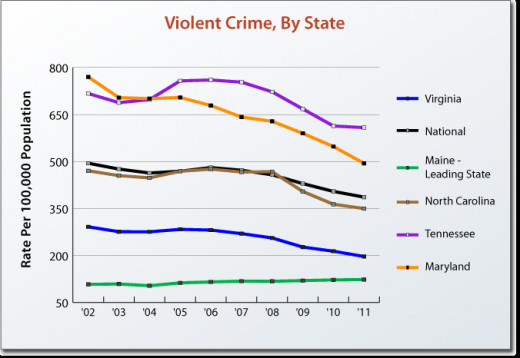
Some Basic Differences in the American Court System When Compared to Other Countries Organization of the law enforcing systems
In terms of resolving serious disputes concerning contract litigations, USA is far ahead in comparison to the other emerging economies. An average contract dispute will only last for about 300 days and he value of the litigation will only go up to about 25% of the stake. In sharp contrast lesser developed nations like Africa take about 400 days to resolve these issues and 50% of the stake money can be spent in conducting the litigation process.
Punishment for law breaking behavior
USA relies heavily on incarceration as a swift and effective way of dealing with felony and misdemeanor. Other leading economies like the United Kingdom rely on community based responsive sentences, psychological counseling and treatment for addictive behavior as a part of dealing with aberrations in terms of following the law.
The sentence lengths in the USA are longer than in other nations and the law enforcing authorities do not levy heavy fines as in comparison to other economies. A commercial payment in order to avail bail is also allowed in the USA.
Law enforcement systems
The law enforcement systems are typically organized at various levels in the country. There are local, state level and federal groups of law enforcement agencies like the police. Typically local police activities are equivocally divided in between local municipal offices and the county offices.
The county office relies on the sheriffs’ powers for policing and supervision of regulative activities. The size of the regulative forces depends upon the population of the county where it is enforced. Every state has its own police force and this force regulates the nearby rural areas. Any case of arson, theft, traffic violations, alcohol and drug crimes and other issues.
Understanding American Court System
What Type of Crimes Warrant an Immediate Arrest?
Every police system in democratic countries require a warrant before arresting a person or it would be trampling on his fundamental rights that is guaranteed by the constitution. In many cases the police officers can arrest you without a warrant.
Given below are the crimes which would result in your immediate arrest without a warrant.
Committing offence in the presence of an officer
The officer has the right to arrest you if you are committing felony, misdemeanor or any other crime in their presence or have enough evidence that you may commit the same even in their absence.
Cops believe that you may harm anybody
The police system can go for an immediate arrest if they have sufficient reason to believe that you may escape custody with the intention to harm or cause injury to persons or property or destroy evidence which is essential for the conviction.
Fleeing confinement
The police officers can arrest you if you are escaping from custody or are attempting to elude the police officers.
Traffic violations
You can be arrested for traffic violations which may include driving under the influence of alcohol, drugs or any intoxicating substances, failing to stop in case of an accident which has caused death, damage to property or personal injury, attempting to drive under a suspended license or the police have enough evidence that you would disregard a traffic citation.
Breach of order of conditions
The police can arrest you in case of a domestic violence and also if you obstruct the police officer while making an arrest. You need to be very vigilant not to obstruct the course of justice and arrest as it may be a serious crime.
The police system is designed to safeguard the rights of the person, but you can be arrested if the cops think that you are a danger to yourself or to the society
An Arrest Warrant
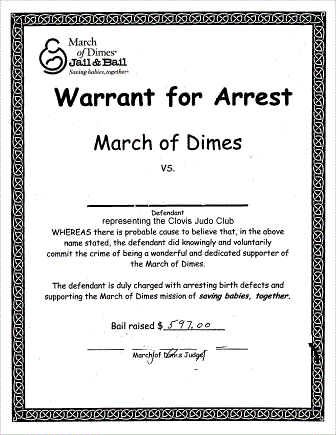
What Basic Procedures Must Cops Follow When they Arrest Someone
When the cops arrest you, they take away your freedom and therefore should follow a determined process to avoid infringement of your democratic and human rights. The police system should ensure that excessive force is not used during the arrest and the cops are entitled to minimum protection while arresting somebody
The officers are to follow the following procedures during the arrest.
Read the Miranda rights
The police officers are supposed to read your Miranda rights which would sufficiently explain all your rights before formally questioning you. It would protect you from self incriminating and explains the fact that anything you might say under questioning could be used against you in court. You have the right to remain silent and have the right to have an attorney present during questioning.
The search
The police officers can conduct a full blown search if you are arrested and also confiscate your car for the search.
Right for telephone call
You may be allowed to call your attorney and your family after the arrest. In many states the police system you may be allowed only one call in case of an arrest and you may not be entitled for the telephone call until you have been booked.
Taking away personal property:
The police may take away your wallet, jewellery and other personal property and prepare an inventory which you can sign. These items would be returned to you when you leave on bail.
Once you are arrested you have to be booked within a reasonable period of time and have the right to a speedy trial. The police are supposed to follow the above arrest procedures and not use excessive force during the arrest. The arrest is a serious process and the police system must make sure that your rights as a citizen is not trampled while questioning or during the arrest
Miranda Rights- every person arrested is entitle to

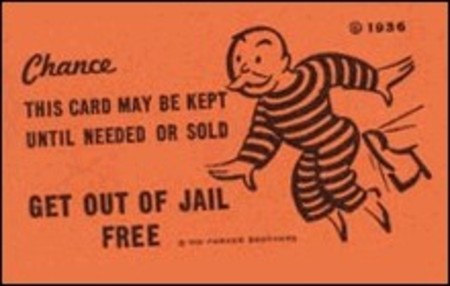
When and How are Convicted Felons given Parole
Parole is the release of a convicted individual before the whole term of imprisonment is over. This parole is always under the strict observance of the concerned prison and law authorities. The individual on parole has to observe certain terms and conditions for a fixed period of time and will be periodically supervised by law enforcing officers. Provisions of parole are different in different states.
Why is parole given?
Parole has many benefits both to the convict accused of felonies and the state law regulating agencies. It’s considerably less costly to keep the parolee in free society under observation than to keep him/ her in prison. In prison the state has to pay for maintenance and food of the convicts but a parolee is responsible for his own maintenance.
The society is also benefited because the parolee is under supervision and is also expected to contribute in a beneficial way towards community development. In this way parole is a productive way of rehabilitation which is used to steer convicts accused of felonies towards a more productive and clean life.
Parole for different crimes
Crimes are generally subdivided into three categories; felonies, misdemeanors and petty offences. Felons can be convicted of violent acts like murder, rape, robbery etc or non violent acts like forgery, fraud etc.
In case of felons, parole is generally not granted till the convicted has served at least 70% of the parole term. For a felon who has been convicted of a lesser offence there is a mandate that he/ she must serve at least one third of the sentence.
There has been much opposition to the concept of parole as many lawyers have argued that prisoners should be made to serve the whole of their prison term. Still parole has continued as a form of rehabilitation for many convicts.

What Kind of Jail Terms Can be Relieved with Immediate Bail?
Bail is generally defined as the security ‘in form of monetary amount given by the accused individual as a form of guarantee that he/she will turn up for court hearings. A bail bond or personal bonds are entered into by defendant and the surety of the defendant in a written form. These funds are refunded by the court after the defendant has duly complied with all the dictates of the court.
When is bail bond not issued?
There are several forms of crimes and the law approves the issuing of bail bonds in many cases to reduce the load on the jail system. However in cases where the individual is accused of violent felonies and thus perceive to be a danger to the society, bail bonds are not issued.
When a person has been charged with capital murder, aggravated kidnapping cases, severe attack on la enforcing officers and injury to children, senior citizens or disabled citizens, he/she cannot be released on bail. In cases of human trafficking, aggravated robbery, armed burglary and sexual abuse of children bail cannot be granted.
Options to avail bail
If a person is arrested and his/her charges have a specific bond amount then that individual can post the bond or ask a close friend or relative to post the bond and instigate release from the jail system.
Surety bonds are a type of bond which can only be accepted from a bonding agency with proper registration. The agency which posts the bond and the individual posting the bail has a mutual contract with specific terms of agreement. The accused has to appear in court at all times whenever required. If the accused has a valid photo ID then he/ she can also post a cash bond in the form of hard cash, cheque or money order.
What Kind of Felonies Warrant an Overnight Jail Term?
Serious crimes which might harm or physically injure any victim are considered as a felony. Though many felonies like murder can lead to almost one year of imprisonment, a few white collar felonies are held for an overnight term in the US jail system, and knowing about them becomes important.
Carrying concealed weapons without license
If you are carrying a concealed weapon or a gun on the body or either in close proximity, without an official permit through law or by the local government, you can be charged for an overnight term in jail. As carrying a weapon in illegal way can cause harm to another person, you are usually sentenced overnight in the jail system until they the cops are assured that you are sane and credible.
Attempted burglary
Breaking into someone else’s home or entering another person’s home without their permission is considered as illegal and can warrant for an overnight felony. As the main purpose of housebreaking is for theft or burglary, it is accounted as a crime and the person can be jailed overnight for interrogation by the cops.
Wanton endangerment
When you are found to be guilty of wanton endangerment or the law feels that you are trying to cause harm to the human life by either hurting someone physically or trying to kill someone, you can be a suspect under the US jail system and can be held for an overnight in the jail.
Battery
When you touch a person intentionally to hurt them or use a violent force to grab them, punch or push them, you can be held in the jail system overnight. As battery can lead to some form of threat and maybe even small injuries at times, it is considered as a felony.
Basic Ways in Which Judges Judge the Seriousness of a Crime
It is common knowledge that if you have committed a crime you must face adequate punishment for it. The court system makes it mandatory for judges to follow the punishment prescribed in the law in case of serious offences like drunken driving or child molestation. Other than such heinous crimes, judges have been known to use their discretionary powers and judgment to evaluate the seriousness of the crime. In fact, judges consider several factors while evaluating the extent of the crime and passing a sentence is appropriate for it.
Mitigating and Aggravating Factors
Factors that commonly influence a judge’s opinion of the crime and the defendant are referred to as mitigating or aggravating factors. Such factors help the judge to form his opinion about the accused, understand the severity of the crime and pass sentences accordingly.
Your Personal Background
This is one of the first things to be considered by the judge. A check on your personal information will include your past and present record (if you are a repeat offender or on parole and so on), your character and background. The fact that you are a responsible and productive member of your local community will also influence the judge while deciding on the seriousness of the crime.
Nature of the Crime and its Impact
This is obviously the next most important factor considered by the court system while evaluating the severity of offence. While understanding the nature of the crime, the judge will consider the extent of violence involved and whether any firearms were used.
The condition of the victim, the extent of damage caused, the value of property destroyed or stolen, whether the victim was a stranger or a known person etc are also considered by the judge while deciding the brutality and extent of the crime committed.

Basic Ways Crimes are Classified
Crimes are generally termed as acts that are morally and socially damaging and have the potential of instigating widespread community disapproval. An act of crime requires a punitive reaction or any other strong measure and the court system of the USA tries to fulfill this need. Any act of legal disobedience to the state laws is a crime but there are various degrees of crime.
Felonies
Felonies are crimes of the highest order and they have an extremely serious nature. The punishment for a felony cannot be less than one year of jail sentence. The maximum punishment for such a crime is lifelong imprisonment or death.
A felony is sure to incite a prison sentence. Examples of felonies are homicide, armed robbery, kidnapping, rape, possession of dangerous explosives and arms, arson, fraud, forgery etc. There are two kinds of felonies; violent and non violent.
Misdemeanors
A misdemeanor is a crime which is less offensive and less serious than a felony. These acts are punishable by law but they may or may not incite a jail sentence. Misdemeanors are usually dealt with heavy fines, penalties, reformatory sentences.
If at all a jail sentence is served by a court system it should be less than one year. Such sentences are served in local county programs or other legal structures. Some misdemeanor examples are shoplifting, conducting behavior in a disorderly way, getting into brawls and street fights etc.
Petty offences
Petty offences are often said to be “insignificant crimes” though no crime can be really insignificant. By These actions do not incite jail sentences but they are dealt with by community sentences and minor fines.
Some examples of petty offences are breaking traffic rules, not following road regulations, drunk driving and other minor infractions. This classification of crimes is based on the severity of the action.
What Factors Contribute to a DUI charge?
In the US, a DUI (driving under influence) charge is a serious offence that carries with the monetary penalties and other penalties like electronic monitoring, and possibly jail time.
There are certain factors, as defined by the police system in the US that can increase the penalties levied on a DUI charge. These factors are better described below.
Prior Convictions on DUI charges
On your first instance of a DUI charge the courts will be lenient on you. But as the instances increase and you are labeled a repeat offender, the charges get more and more harsh. In some states, the convictions levied on you in other states are also taken into consideration while levying a charge.
High levels of BAC (blood alcohol count)
In some jurisdictions, the level of alcohol in your blood, as decided by the breath analyzer test or a blood test is an important criterion in fixing the penalties of the charge.
Refusal to comply with testing procedures
If under a DUI charge you do not comply with the requirements of the police system and refuse to submit for a breath analyzer test or a blood or urine sample test, then the penalties levied on you can be harsher than normal.
Speeding or driving recklessly when under influence
DUI is an impossible charge to get out of, and to top it all if you are caught speeding or driving recklessly when drunk, the charges can get compounded and your penalties might increase.
Endangering the life of your child
Many states have an age limit (mostly 6 an above) and if you are found to have endangered the life of your child with your driving skills, or the lack thereof, then you can expect a heavy penalty that may even go to the extent of removing the child from under your custody.
Coping with DUI Charges
How a Jail Term can Affect your Employment Record
When you have served a jail sentence in the past and have a record then it’s better for you to know that this record is never ever going to completely vanish. The biggest side effect of having a record in the jail system is reduced employment chances. The time you spend out there looking for a suitable job is going to be a real challenge. Here are some ways you are going to get affected in terms of your career.
Negative Human resource impression
As a person with a jail record you are likely to create a negative impression even though you might possess excellent personal characteristics. This is due to certain pre conceived ideas present n the minds of the hiring committee or the human resource department.
Generally human resource is more concerned about hiring employees who will be responsible and will prove to be assets to the company in the long run. They will think that hiring employee with criminal record will expose their company to the risk of negligent hiring lawsuits. After all a person with a jail record can be involved in some violent activity in the future and this activity can affect the image of the company badly.
Limited job opportunities
As a person with a record you will not get employment in any government office or a law enforcing position. You cannot progress beyond a certain point in your career because for all jobs belonging to the senior management level there will be a requirement of a clean bill for the past.
You can only get employment in sectors that participate in employment programs conducted by a jail system. You will have to be open about doing any work that comes your way and think of it as a stepping stone to your future.
From Jail to Employment
Basic Difference between a Misdemeanor and a Felony
The United States criminal code divides crimes into two broad categories of misdemeanor and felony. A basic understanding of the differences between these two categories is essential if you want to appreciate the different legal proceedings involved. The fundamental distinction is made on the basis of tenure of punishment and the category of prison.
While misdemeanors attract a maximum incarceration or jail term of twelve months, felonies are crimes that attract incarceration in excess of twelve months. So in general, a felony is considered as a more serious crime as compared to a misdemeanor. Moreover, a person convicted for a misdemeanor usually spends his incarceration period at a local jail whereas a person convicted for felony must spend this time in a penitentiary or state prison.
Categories of Felony
Felonies are crimes such as murder, rape, physical assault, peddling drugs, arson, massive burglary, kidnapping etc that are punishable by long-term incarceration. Depending on the severity of the crime, a felony is categorized as E or F that indicates thefts or similar crimes whereas more serious offences such as homicide are considered as category A felony.
According to the seriousness of the felony, the tenure of incarceration may extend from more than one year to life imprisonment (with no hope for parole) or even death penalty. In other words, crimes that are punishable by death are considered as felony in states that have death penalty.
Misdemeanor to Felonies
A single act can aggravate from a misdemeanor to a felony depending on the weapons used and the severity of the damage caused to the victim. For example, whether a theft can be considered as a misdemeanor or a felony will depend on the value of the items stolen. Similarly, intimidating a person with threat of violence or a light brawl is a misdemeanor whereas it can easily become a felony if that same threat is carried out using guns and other weapons.
A Misdemeanor vs. a Felony

What Kind of Crimes are known as Serious Offences?
The Federal Bureau of Investigation (FBI) publishes important statistics about crime rate in the US through Uniform Crime Reporting (UCR) system. This is one such important part of the US court system, which provides important information to the public, media, students and executives of law and other researchers. The crimes are divided into 2 parts - Part 1 (serious offences) and Part 2 (less serious offences). Here are the crimes (part 1) which are known as serious in the US.
Personal ones/ violent
Aggravated assault: This includes attacking someone unlawfully which has or can result in serious bodily injury, or even death. It also includes use of, or threatening to use weapons like knife, gun or others which can result in injury.
Forcible rape: This only includes rape of women – unlawfully, forcibly, against her will. This also includes attempt to commit rape or actual rape, using force, or threatening to use force.
Murder: If a personal is killed intentionally or negligently, it accounts to murder. Murder or homicide is a serious offence in the US.
Robbery: This includes taking away something that has value, from someone. It can be either by force or violence, or by threatening to exert force or turn violent.
Property crimes
Arson: This includes burning or trying to burn a house, a public building, monument, vehicle, aircraft, personal property – with or without intending to defraud.
Burglary: According to the court system, entering a place with the intention of stealing or actually stealing is a serious crime. Forcible entry may or may not be there in this case.
Larceny theft: This includes unlawfully taking or attempting to take other’s property like a bicycle, vehicle, shoplifting, pick-pocketing and others. This is done without force or violence.
Motor vehicle theft: This includes trying to steal or theft of a motor vehicle belonging to someone else.
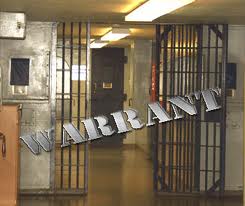
What Kind of Warrants are Commonly Used in the US Legal System?
A warrant is a document sanctioned by the court that authorizes the police or similar law enforcement agencies to take certain steps that are considered a necessary part of a criminal or civil legal proceeding. Warrants are usually criminal or civil in nature.
Criminal Warrants
In the US, criminal warrants are either search warrants or arrest warrants. An arrest warrant is issued by the agencies in order to detain an accused who is assumed to have committed a crime so that he cannot escape or tamper with evidence.
Such warrants are usually issued after it has been ascertained without doubt that the said crime has indeed been committed by the person in whose name the arrest warrant has been issued. Bench warrant is also a type of arrest warrant which forces an individual to appear in court.
A search warrant is issued when the law enforcing agencies want to search an individual or a private property to gather evidence of crime. Such warrants are issued by the court only after the enforcing agency or police submit a written request and provide a sworn statement. A search warrant usually includes all details of the property, place or individual to be searched.
Civil Warrant
A civil warrant is handed out by the court for different issues related to civil lawsuits. Such warrants include warrant in debt and warrant in detinue. A debt warrant is issued in cases dealing with monetary claims. The basic purpose of such a warrant is to establish a court date for commencement of proceedings.
Debt in detinue is issued in cases dealing with property claims. Such a warrant is issued by the judge on behalf of the plaintiffs to the defendants and carries the power of default judgment. This means that the judge can rule in favor of the plaintiff on the basis of this warrant if the defendant does not respond within a specific period.
To find out more about court warrants in the United States, you should turn to websites such as Maryland Arrests or US Marshals Service . To learn specifically about issues related to criminal and civil prosecution, go to this site.

What are the Typical Charges inflicted on Someone who Assaults a Cop?
Assault is a serious crime and it typically means “using physical force to inflict bodily harm”. Assaulting a citizen in USA is a serious crime and can incite a jail sentence. However the consequences are even more severe when somebody tries to assault a police officer or a member of any low enforcing group like special duty cops etc.
What are the conditions of assault?
According to the national laws the definition of assault on a police officer is a little different as compared to assault on a common citizen. Just like directly hitting/punching/pushing a police officer is a crime resisting the action of a law enforcing cop also qualifies as an assault under police system.
Typical resistive actions include trying to stop a cop from entering a gate or trying to resist a cop who is trying to pull you out of a car. Not putting your hands out of your pocket or resisting a body search by a cop also qualifies as assault under the police system of USA. All these type of actions fall in the category of felony or crime of the highest order which can incite jail sentence exceeding one year.
Assault without excusable cause
The law is vocal and strict about people who try to cause bodily harm to cops without justified cause. If someone engages in a violent act that can cause bodily injury to an officer on duty that person can be sentenced to a maximum of ten years or can be fined up to $10,000.
Resistance to action of a cop
Resisting or opposing the action of a cop without justified cause will make the offending person guilty of misdemeanor. The punitive jail sentence will not exceed 180 days and the fin will not exceed $1000 in this case.



